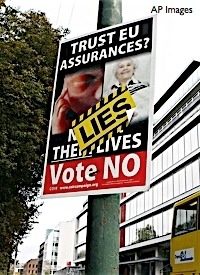
Irish voters will once again vote in a referendum on the EU’s Lisbon Treaty on October 2, which they last rejected on June 12, 2008 by a 53 percent to 46 percent “No” vote. Ireland’s rejection of the controversial Lisbon Treaty effectively blocked its implementation, since it must be agreed to by all 27 EU-member states to come into force.
The treaty would increase the centralization of power in Europe by giving the EU its first full-time president and a foreign policy chief. It would also abolish national vetoes in key policy-making areas such as immigration, justice, and police affairs.
However, with Ireland suffering from the effects of the worldwide economic recession, the treaty’s supporters are banking on the fact that Irish voters who were previously skeptical of the threats to their national sovereignty presented by a stronger EU may be won over by promises of the prosperity that will come with full European Union membership.
IrishCentral.com, an Irish-American news website, reported that Ireland’s Finance Minister Brian Lenihan told the press on September 26 that another no vote would damage investor confidence in Ireland, warning: “This is very clear from all of the testimony we have from people who actually invest and create real sustainable jobs.” The report cited Lenihan’s assertion that that Ireland couldn’t afford to be isolated from the rest of Europe at a time when the country’s economy is in crisis.
The report also quoted Taoiseach (as Ireland’s Prime Minister is called)) Brian Cowen, who told the press that it was imperative that Ireland does not give the impression it is turning its back on Europe: “Friday’s referendum on the Lisbon Treaty will be a defining moment in the country’s destiny. The road we choose will not only determine the shape of our economy, but define our place in the wider world and the destiny of this generation and our children’s generation for years to come.”
Another voice warning of dire economic consequences if Irish voters again rejected the treaty was Michael O’Leary (the eccentric CEO of Ryanair airlines, who has proposed standing-room-only space on some flights!) who said ominously: “If we vote no the cost of borrowing will rise significantly, we will lose an EU commissioner because we go back to the Nice Treaty and we will lose a veto on direct taxation.”
Another influential business leader lobbying for approval of the treaty is Jean-Philippe Courtois, president of Microsoft International, who was quoted in the Irish Times as describing himself as “more a European citizen than French.”
“We have a shift of power between China, Brazil, the Indias of the world and the US,” said Courtois. “Europe needs to step up both economically speaking and politically speaking. That treaty has to be clearly embodied and move on with all the citizens in Europe.”
Not all Irish voices were supportive of the Lisbon Treaty, however. Irish Central quoted James Reynold, the chairman of the Farmers for No campaign, as believing that the treaty threatens Ireland’s food industry and may contribute to the possible loss if 80,000 jobs. “If we say yes to Lisbon, we will be giving a blank check to Brussels to abuse farmers, to force them to become dependent on hand-outs and subsidies,” Reynolds said. “A farmer who votes for Lisbon is in effect a turkey voting for Christmas.”
The Wall Street Journal reported that Cowen said on September 30 that there won’t be a third referendum if there is a "No" vote in this week’s referendum and predicted that a second rejection of the treaty would lead to a two-tier European Union. He stated: “There won’t be a Lisbon III — that’s for sure.”
BBC news also quoted Cowen’s pro-treaty sentiments: “In terms of our present financial crisis, the centrality of Europe in helping us to stabilize and move from crisis to recovery is absolutely fundamental. And solidarity and support is a two-way street. I think it’s also important at this critical time that we send a positive signal to the European Union.”
Irish government research cited by BBC found that people voted No last year because of fears about losing an Irish EU commissioner, worries about a threat to low corporation taxes, and a perceived threat to both Irish neutrality and anti-abortion laws.
However, noted the report, Cowen received guarantees on those issues from his EU colleagues before deciding to re-run the referendum.
The credibility of those “guarantees” among Irishmen is by no means universal, however. Gerry Adams, the president of Ireland’s Sinn Fein party, remained unimpressed, stating: “There isn’t one comma of difference from the treaty that’s being out forward in this referendum to the one that was rejected by citizens in the last referendum.”
An Irish Voice reporter notes that the most recent Irish polls indicate that between 48 percent and 55 percent of Irish voters favor approval of the treaty. However, there are still enough undecided voters that the final result could be close. The main hope of those opposed to the treaty lies with the Irish people’s traditional love of independence and a justifiable fear of foreign domination spawned by centuries of British rule.
This time around, it is not Ireland’s fate alone that will be decided, because a Yes vote on October 2 will only encourage the European Union to complete the transformation of Europe from a continent of formerly sovereign states into a regional mega-state centrally ruled from Brussels.
Photo: AP Images



